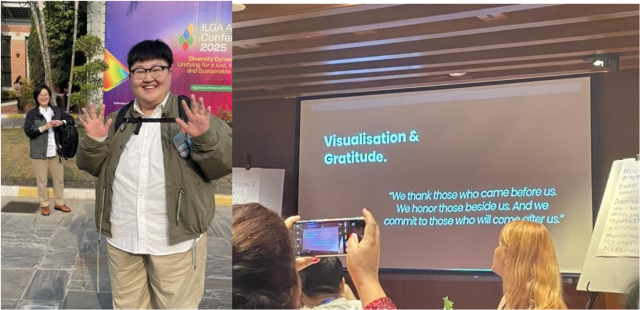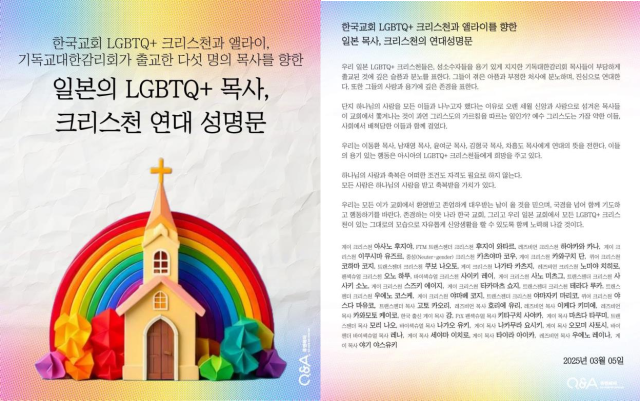For Daeun Seo of the Korean Methodist Church, the ILGA Asia Conference was a moment of inspiring interfaith connection for LGBTQIA+ action.

This February, I had the privilege of attending the ILGA (International Lesbian, Gay, Bisexual, Trans, and Intersex Association) Asia Conference in Kathmandu, Nepal, where I reflected on the LGBTQIA+ movement within the Korean church and gained new perspectives from participants from across Asia. The support of the United Church made my participation in this conference possible, and it became a truly meaningful learning experience. Today, I would like to share one of the most impactful and moving experiences I had during the conference—the interfaith Session.
In many parts of Asia, the church’s influence is relatively limited. Many of the participants in the interfaith session came from South Asia, where Muslim-majority cultures are predominant. The session began with a solemn moment of mourning for Muhsin Hendricks, a South African imam, Islamic scholar and LGBTQIA+ activist (also described as the world’s first openly gay imam), who was assassinated earlier this year due to his sexual orientation. As we confronted the harsh reality of LGBTQIA+ discrimination and oppression within religious spaces, we honored his memory and prayed for his peace in our own ways.
Participants in my group discussion from Muslim, Buddhist, Catholic, and Protestant backgrounds identified commonalities in the discrimination we each faced. I introduced the situation in Korea by sharing the story of a fellow pastor I work with. In 2019, he was excommunicated from the Korean Methodist Church simply for blessing LGBTQIA+ individuals at a Pride event. Since then, he has been fighting for reinstatement through legal action while continuing to support LGBTQIA+ Christians and challenge discrimination within the church alongside myself.
Some participants saw potential ways to implement similar strategies within their own religious communities. Likewise, I gained valuable insights from their experiences that could be applied to our work in Korea. Despite differences in religious and cultural contexts, there are many points of connection where we can work together. This session taught me that when we truly listen to one another, meaningful solidarity and cooperation can emerge.
One particularly striking realization came from non-Christian participants. Despite knowing little about the church, they assumed that Christians should seek justice and righteousness. After witnessing years of discrimination carried out in the name of Christianity within Korea, I had nearly forgotten this fundamental truth. Yet I was reminded by people outside the faith that our core identity, as followers of Christ, is to uphold love and justice—just as Jesus did. It was a small but profound moment of hope.
Inspired by these learnings, I began collaborating with Rev. Reina Ueno from Japan, whom I met through the United Church. Since 2019, Korean pastors who have expressed support for LGBTQIA+ inclusion have faced repeated excommunications. During the conference, we received the devastating news that several Korean Methodist pastors—who had dedicated over 40 years of service to the church—were expelled simply for offering a blessing at a Pride event.
Rev. Reina and I decided to use our differing social contexts to our advantage. In Japan, it is relatively easier for pastors to be open about their gender identity and sexual orientation within church spaces. With Rev. Reina’s help, we gathered supporters who publicly included their gender identity and sexual orientation alongside their names in a statement of solidarity.
This statement deeply moved LGBTQIA+ Christians and community members in Korea. It spread rapidly on social media, prompting many to question the exclusive stance that Korean churches had long upheld. It also demonstrated that churches do not have to be spaces of exclusion—they can be places of radical inclusion and hope. In many Asian countries, LGBTQIA+ rights have been most obstructed by religious institutions, making faith-based advocacy even more crucial.

As the interfaith session drew to a close, the facilitator asked me to offer the final prayer in my native language, which follows below. Among the attendees, only Rev. Reina and I were Protestant, yet everyone closed their eyes and joined their hands in prayer together, a moment that became a source of courage that I carried back with me to Korea.
“Lord who loves us, thank You for inviting us here just as we are. You have given us a world full of diverse colors—let us live in that diversity. Even when we face hardships in this chaotic world, may we all be surrounded by the peace of the rainbow. I pray for a rainbow of peace for all of us. I pray in the name of Jesus who came to this land in a diverse way. Amen.”
—Daeun Seo works at Q&A (a Queer Question for Korean Churches), and is a lay person of an inclusive ministry of the Korean Methodist Church. Q&A works to support queer Christians, building a transformative, inclusive faith movement, advocating against discriminatory denominational policies against sexual and gender minorities, and developing educational resources for affirming ministries.
The United Church of Canada has long been a leader in advocating for justice, equity, and inclusion, including for the 2SLGBTQIA+ community. However, the work of creating inclusive spaces within faith communities is still complex, particularly in global contexts where religious-induced homophobia and systemic oppression persist. In the Global South, where intersections of colonial histories, socio-economic inequities, and polarization fueled by anti-gender movements create unique challenges, courageous United Church partners, LGBTQIA+ people of faith and allies are leading transformative efforts to advance LGBTQIA+ rights.
Support this work by donating to our 2SLGBTQIA+ Global Advocacy Fund. Your Gift will advance the rights of 2SLGBTQIA+ people around the world. Make a Gift Today.
The views contained within these blogs are personal and do not necessarily reflect those of The United Church of Canada.